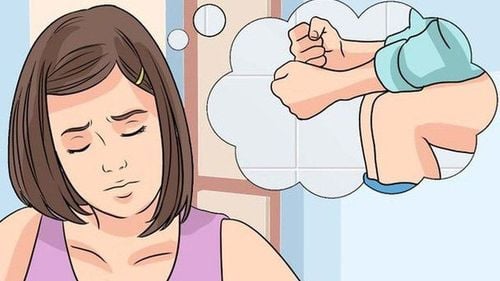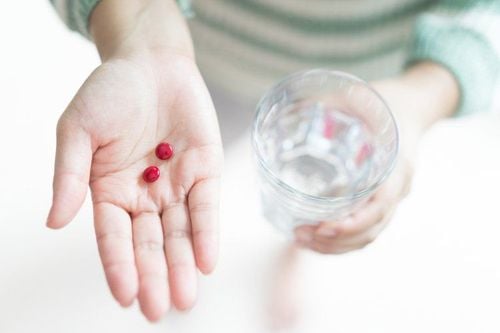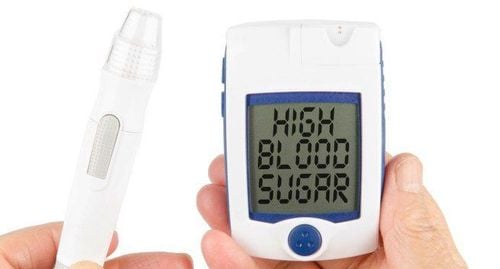This is an automatically translated article.
Different from playing sports, going to the gym not only helps you look slim and fit, but also continues to burn calories, build muscle even after finishing a 3-4 hour workout. Beginners often have a lot of surprises, so how to gain muscle and lose fat properly?
1. Consistently adhere to the exercises
You don't have to train massively, but you do need to pursue a long-term, personalized exercise plan. Advice and training plans are available on many reputable health websites or professional bodybuilder videos.
For example, doing basic moves like lunges and squats will work the front and back thigh muscles (hamstrings). At the same time, cardio exercises will promote the legs to start building and developing muscles.
If you can't hire a personal trainer, you should at least need an instructor at the gym when you're just starting out. Correct technique is the main goal from the start, otherwise you are very vulnerable to injury. At the same time, adjust the weight and exercise time long enough to fatigue the muscles. You can start with a weight of about 2kg for the time being, repeating as many times as you can to get comfortable. Lifting weights lighter but more reps is also good advice.
Experts recommend performing each exercise 3 times, each time 8 - 12 reps. Should do 2-3 exercises for opposing muscle groups. Before moving on to the next muscle group, there should be a reasonable rest period.
One tip for pursuing muscle growth goals is to create a weekly workout plan to track daily. It is recommended to join online groups of gym people to be encouraged, motivated, and together to share experiences and situations.
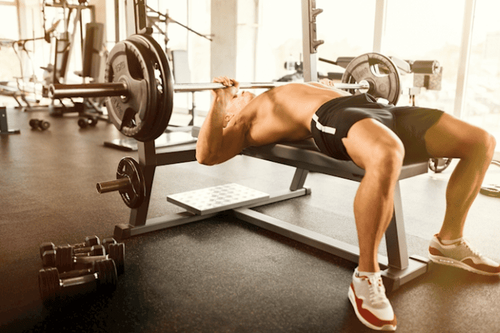
Các bài tập phát triển cơ bắp sẽ giúp bạn có một thân hình mong muốn
2. Alternate muscle groups
Lifting weights will stimulate muscles to work, then repair and rebuild while you rest. If muscles do not have enough time to recover, serious injury can occur.
So you can split the training schedule for each muscle group separately into 3 days as follows:
Day One: Chest, biceps (triceps / triceps) and shoulders; Day two: Lower body, including front and rear thighs, glutes, inner and outer hip muscles, calves; Day three: Back, biceps (biceps / biceps) and abs. Muscle soreness often has a late onset, up to 48 hours after exercise. If you feel pain, you should spend another 1-2 days resting or working out a new muscle group. Although discomfort in the muscles is normal, it should be taken into account if there is a problem in the joints.
3. Drink plenty of water before and after the workout
Adequate hydration is essential for muscle gain. People who do not play sports regularly also rarely drink enough water. So, in addition to the recommended 8-10 glasses of water daily, you should drink 300-500 ml of water before your workout. Then, drink 200 - 300 ml of water for every 15 minutes of intense exercise. Only add sports drinks if you exercise for longer than 1 hour. At this time, the body will need to replace electrolytes to avoid falling into a bad state.
In addition, you can also treat yourself to a cup of coffee or a caffeinated drink about 1 hour before the gym to increase your body's endurance. Research has shown that pre-workout caffeine consumption reduces perception of muscle pain and increases performance in activities, from cycling to weightlifting.

Bạn có thể sử dụng một ly cà phê trước buổi tập khoảng một giờ
4. Balanced Diet
What to eat to gain muscle? Building muscle requires a balance in the diet, including carbohydrates, fats, and proteins, as well as many vitamins and minerals. All of these essential nutrients are best absorbed from natural food sources.
Avoid eating a lot of bad carbohydrates because it can cause insulin levels to spike and inhibit the hormone that promotes muscle growth. Instead, you should divide your daily meal into 5-6 small, balanced and nutritious meals.
If you want to gain muscle and lose fat, you don't need to go on a strict diet. The body will not be able to perform the exercises to its full potential if there is a calorie deficit. Do not let fat intake more than 30% of total daily calories, and eat more fruits and vegetables rich in vitamins and minerals.
5. Add more protein
The key to building and growing muscle is protein. Muscles are made up of protein, so you need essential amino acids to replenish your body's protein.
If you don't have time to cook, you can use protein-rich snacks such as: cottage cheese, cottage cheese, protein bars and whey protein milk. Many protein powders can be mixed with water or low-fat milk to easily add more protein to your daily menu.
Other protein-rich options include: turkey, cheese, cookies, as well as some pre-packaged foods with high-protein and low-fat ingredients.
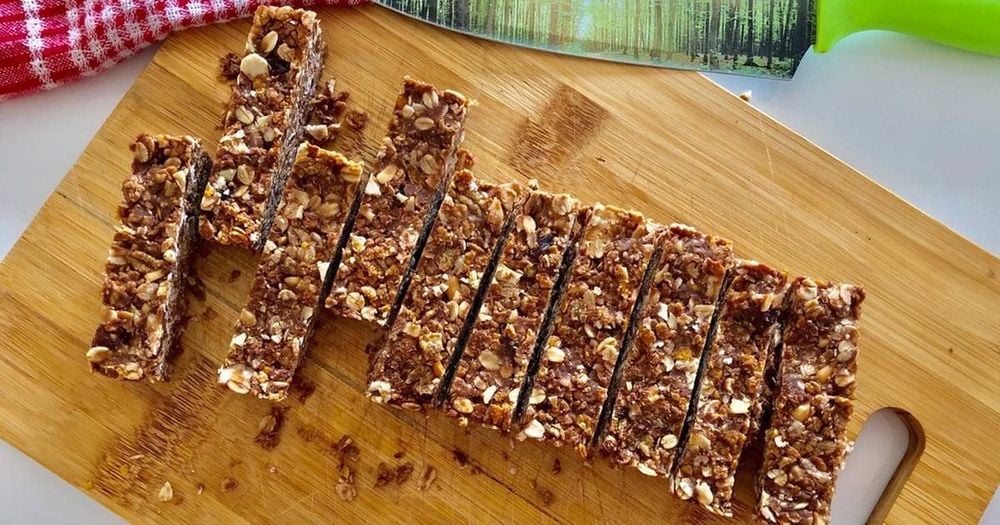
Bánh quy Protein là một sự lựa chọn cho người muốn phát triển cơ bắp
6. Get enough sleep
Lack of sleep has been linked to high blood pressure, depression and other health problems. Among them are growth hormone inhibitors, which are important for building muscle. Recent studies also show that lack of sleep can lead to obesity.
According to the CDC report, people who get enough sleep to gain muscle and lose fat will always feel awake and do not need to nap. On the contrary, you will always be tired and sleepy at noon when you are sleep deprived. The average adult needs about 7-8 hours of sleep, some may need more than that to be considered adequate.
7. Hire a coach
Consider hiring a personal trainer to help you achieve your goals and reach your limits, as well as align and execute each exercise with correct technique. The cost of hiring a PT (personal trainer) will vary depending on the center and experience, averaging several hundred thousand VND per hour.
However, you don't need to train with a trainer for long periods of time. Just 3 months is enough for you to feel comfortable, confident in the gym, establish a routine, learn many movements and get positive results.
A good coach will guide you very conscientiously during training and will not make you dependent on them for long. Ideally, you'll learn the skills to both stay in shape and work towards new goals.
Make sure your trainer is certified by a reputable fitness organization and has a basic knowledge of resuscitation and first aid. In addition, it is also a good idea to hire someone you like to easily practice and talk to each other, at least 1 hour per week.
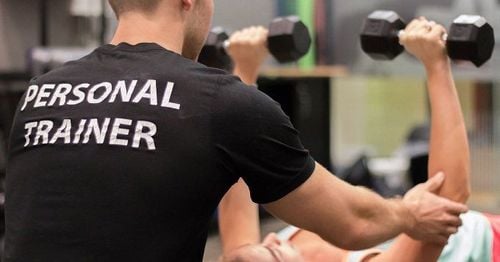
Thuê huấn luyện viên giúp bạn có thể tập luyện đúng kỹ thuật trong việc phát triển cơ
8. Relax
During exercise, breathing evenly and staying calm can help your brain and muscles work better. Before exercising or moving on to the next set, take a few minutes to relax and focus on your breathing.
A study has found that mental training can increase muscle strength. You can imagine yourself sitting comfortably on a bench during squats, always thinking that you're using less energy than you're actually going to lengthen your endurance.
In addition, it is recommended to combine playing sports or exercising with music. Research has shown that listening to catchy songs while working out makes you lose focus on the weights and not feel tired. The right tunes also make you more relaxed and energetic. Rhythmic songs also help you perform repetitive movements more rhythmically.
Exercise in general is important for heart health, lowering cholesterol and regulating blood pressure. Any exercise that gets your heart rate up burns calories and builds muscle and loses fat. A muscle-building exercise regimen also slows age-related muscle loss, builds muscle and connective tissue strength, increases bone density, and reduces the risk of injury and arthritis pain. Regular physical exercise not only controls blood sugar, improves sleep and mental health, but also gives you a balanced, plump and toned body.
Vinmec International General Hospital is not only famous for its quality of medical examination and treatment services but also for having successfully treated many difficult and complicated cases under the guidance of doctors. Professional and experienced doctor. In particular, the medical team is always ready to listen, advise and treat diseases as well as advise on good nutrition and food for all ages according to the individual needs of customers.
Customers can directly go to Vinmec Health system nationwide to visit or contact the hotline here for support.
Reference source: webmd.com




